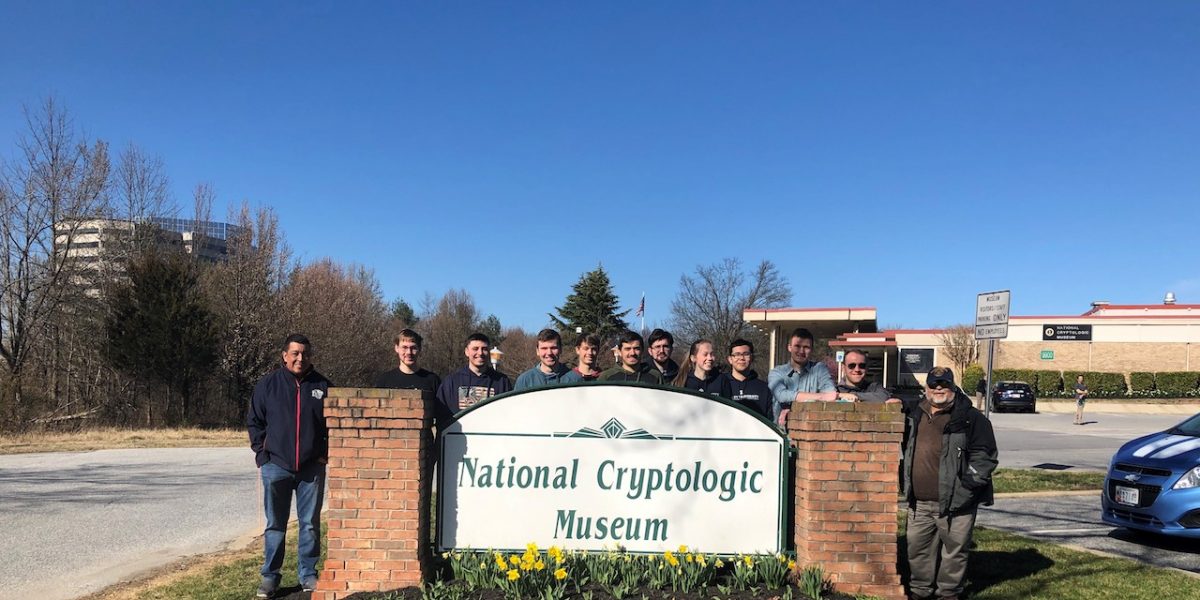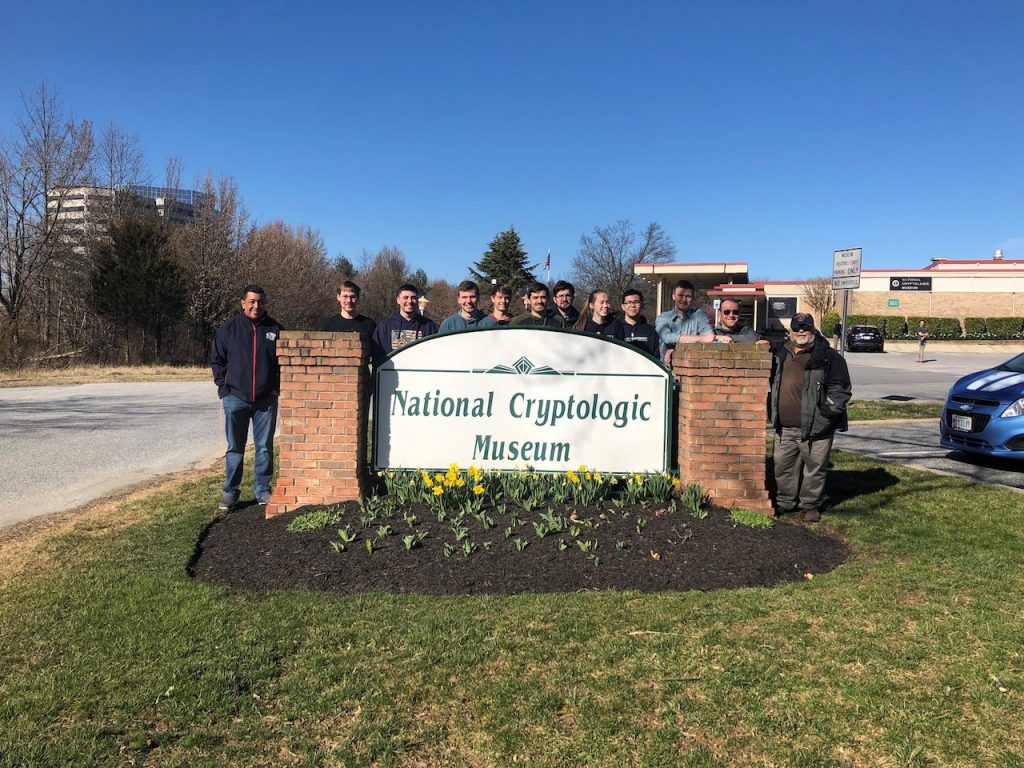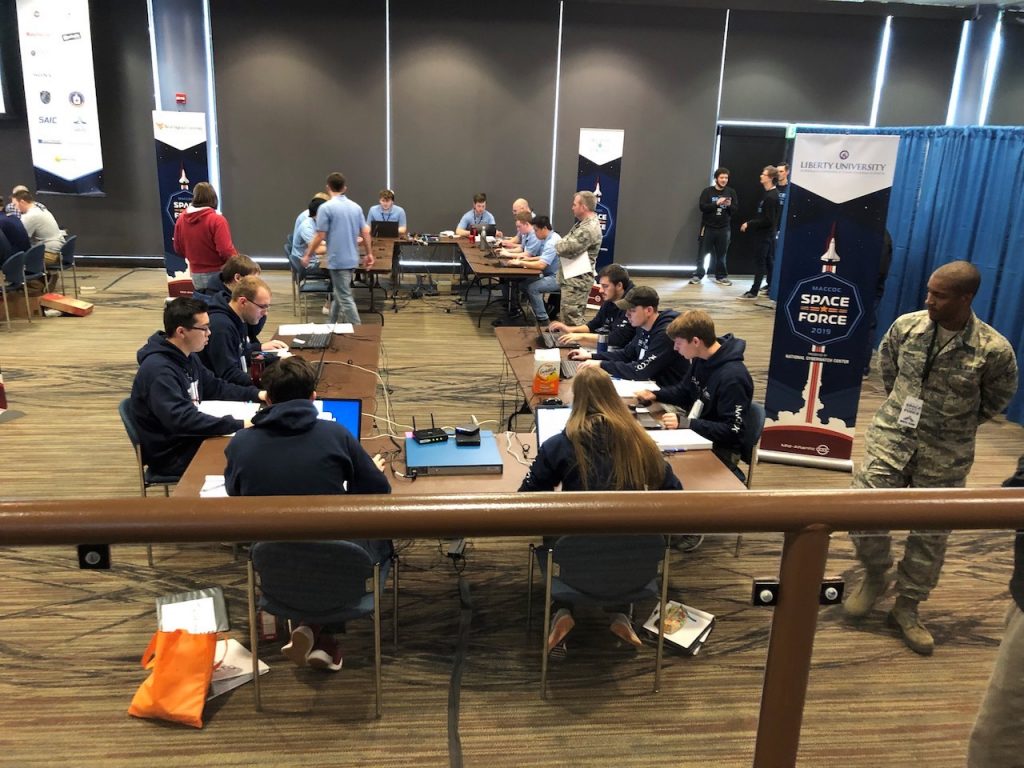Liberty’s Cyber Defense club competed in Mid-Atlantic competition, placing third

When junior Charity Barker became Liberty University’s cyber defense club president in the fall of 2017, she never imaged the success that would follow only two years later.
First, Barker’s team finished in the top eight in a crowded 35-team preliminary round.
After advancing to the Mid-Atlantic Collegiate Cyber Defense Competition (MACCDC) March 29, 2019, Barker’s team of eight Liberty students snatched
third place.
“We’ve done so many crazy and amazing things that I never thought we’d be able to do,” Barker said. “The rankings are cool, but it’s really all about learning. I hoped we would do well, but we’ve definitely surpassed my expectations.”
Barker’s team is more than a group of random computer geeks grinding cyber defense competitions. The team functions like a family.
You may find them at the gym together, or at the movies. They occasionally play games as a collective group, and they can easily demolish an entire Benny’s pizza.
“The team is a pretty solid friend group,” Barker said.
Many members carry heavy academic loads as computer science majors, but they still squeeze time for collegiate cyber security competitions that demand more than 200 hours of practice each semester.
This semester, those long hours escalated to MACCDC, where Barker’s team demonstrated their skills amidst sponsors, vendors and potential employers.
“Getting the real-life practice of defending a network for two days, … it looks wonderful on your resume, and it’s a really solid experience,” Barker said.
At the beginning of the event, the students were given a network of computers with systems and applications to defend. They spent two eight-hour days hardening and defending those systems against professional, ethical hackers (known as the Red Team) sitting in a different room.

FINISH — Charity Barker’s cyber defense club returned to Lynchburg with a third place finish at the MACCDC.
The event, although competitive, teaches the next generation of cyber defenders how to handle terrifying cyber situations under extreme stress. MACCDC intentionally simulates horrendous cyber situations that could potentially occur at corporate offices.
“MACCDC is definitely a nightmare scenario,” Barker said. “Right before the competition, we were kind of nervous, but because we put so much time into preparation … it wasn’t so bad. It’s such a fast-paced and high-energy environment that once you get started, you don’t have time to worry.”
Other schools, including the University of Virginia (UVA) and George Mason University, also participated.
According to Richard Bansley, a Liberty computer science professor and faculty coach, the experience equipped the students to tackle real-life cyber nightmares under extreme stress.
“If you don’t have (difficult) situations like this, (cyber security) students will get out into the workforce, be faced with a stressful situation and not be psychologically prepared to deal with it effectively,” Bansley said. “This competition is an excellent opportunity to do that. It is a pretty realistic experience for what you would see in the professional world.”
Although the team’s efforts did not result in a first-place finish, they are content with the successful results and optimistic about the future.
The UVA team, who placed first at MACCDC, continued to nationals and won. It was the third consecutive year a team from the Mid-Atlantic claimed a national victory.
“We’re right there with some high-powered schools,” Bansley said. “We’re rapidly improving our cyber security academic programs and competition involvement. I don’t know where it will go, but we’re getting pretty good.”
According to Barker, predicting the Red Team’s cyber-attack methods proved challenging. Throughout the grueling 16-hour competition, the team surveyed their networks, trying to identify abnormalities.
They also filled out incident response reports that, if justified, could “arrest” a hacker from the Red Team, taking him or her off the keyboard for several minutes. However, for the purposes of competition, competitors were not permitted to use offensive tactics against the Red Team.
“A lot of cyber defense is knowing what’s normal,” Barker said. “When you know what a normal system looks like, you’ll start to see (irregularities).”
This was Barker’s strategy as her team embraced the tense competitive MACCDC atmosphere.

COMPETE- The team had to work together to solve situations
“The technical part is the easy part, because you can prepare for that, but when you get to the competition, you never know what’s going to get thrown at you,” Barker said. “So knowing how to respond to a lot of different, strange circumstances is the hardest part.”
Graduating senior Dan Ryan, Barker’s teammate, said that although the event lasted two days, the time surprisingly flew by. Each team member remained active throughout the entire process.
Amidst the stress, Ryan remembered his priorities as a Christian: to maintain a Christ-like attitude while under extreme pressure.
“There were times where people were on edge or raising voices, but we had a lot of help to diffuse that,” Ryan said. “First and foremost, we had the duty of being salt and light, as many of the other universities there were not Christian.”
Bansley echoed this mission, saying the MACCDC was more than a beneficial working experience – it was also an outreach opportunity.
“The Liberty University students that go there have a unique opportunity to show, by action, the grace, compassion and integrity of those who follow Christ under duress,” Bansley said. “They show their faith in action and in word. That’s probably something some of the other competitors may never actually see again. They may not be exposed to what it means to be a follower of Christ in a high-stress event like that. So that’s a unique opportunity that needs to be intentionally worked toward.”
The MACCDC emphasizes incident response over other scoring categories. Performing effective incident responses helps competitors not only discover cyber problems, but also prevent similar issues in the future.
“People normally don’t seem to understand that cyber security isn’t just hacking for hacking’s sake,” Ryan said. “It’s really helping keep your information safe through being either the person defending and hardening a network, or running a sanctioned penetration test and looking for holes to report to the people
in charge.”
Bansley hopes to expand the team’s competitive reach by potentially entering multiple events throughout the year.
“The only reason these students are able to do this is of course the Lord … (and) because the university is working diligently to provide the opportunity,” Bansley said. “If the university didn’t provide the support, this would not happen.”
For more information about the cyber defense club or Liberty University’s accredited computer science program, visit https://www.liberty.edu/business/bachelors/computer-science/.
“Cyber security is a field where you can’t stop learning,” Barker said. “If you stop learning, you’re out of date, and you can’t do anything. It’s a culture of always working. We don’t stop practicing.”
